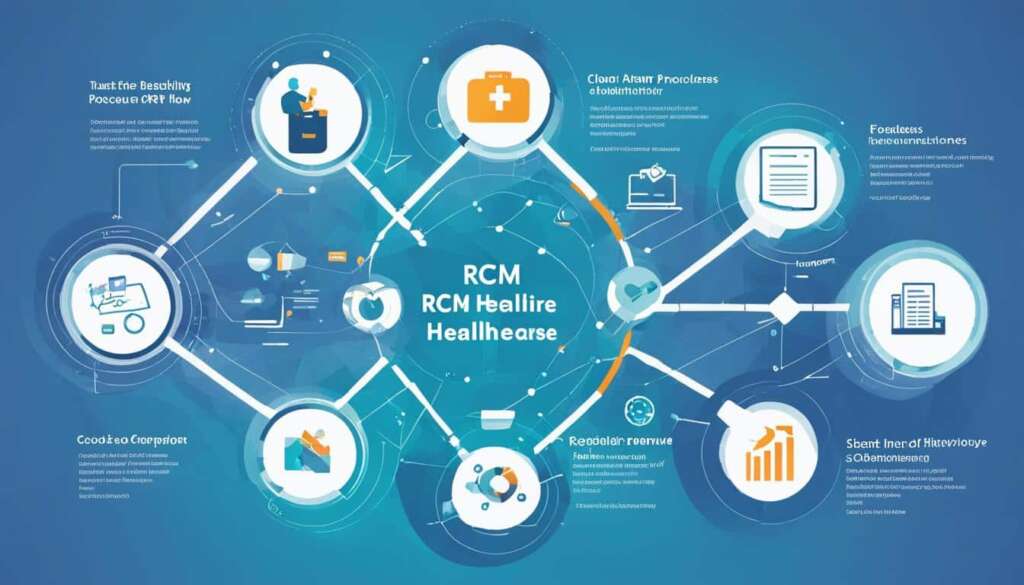Table of Contents
If you work in the healthcare industry, you may have heard the term RCM in healthcare quite often. RCM or Revenue Cycle Management plays a crucial role in managing the financial aspects of medical practices. It optimizes revenue processes, ensuring efficient reimbursement and revenue maximization, leading to improved financial health.
RCM in healthcare streamlines the complex and intricate processes involved in medical billing, coding, claim submission, and reimbursement. By implementing effective revenue cycle management strategies, medical practices can benefit from enhanced operational efficiency, reduced claim denials, and an overall improvement in practice profitability.
Key Takeaways
- RCM in healthcare optimises financial health in medical practices.
- RCM streamlines revenue processes and ensures efficient reimbursement.
- Effective RCM strategies lead to revenue maximization in medical practices.
- Medical practices benefit from enhanced operational efficiency and increased profitability.
- RCM reduces claim denials and improves overall practice profitability.
Understanding RCM in Healthcare
To optimise the financial stability of medical practices, healthcare providers must understand the concept of RCM. Revenue Cycle Management (RCM) plays a crucial role in managing the finances of medical practices. At its core, RCM is the process of managing claims, billing and payments to ensure a smooth cash flow.
RCM is a complex process that involves several intricate steps. Medical billing, for instance, is one of the pivotal aspects of revenue cycle management. Medical billing involves submitting claims to insurance companies for reimbursement of medical services rendered to patients.
Medical billing requires expertise and knowledge of medical coding, which involves classifying clinical procedures and medical diagnoses using standard codes. Successful medical billing requires timely submission of accurate claims with the correct codes to the insurance companies.
“Medical billing requires expertise and knowledge of medical coding, which involves classifying clinical procedures and medical diagnoses using standard codes.”
Once the claim has been submitted, the medical practice awaits payment or reimbursement from the insurance company. The reimbursement process can be time-consuming and challenging, with the potential for claim denial or rejection for various reasons, including incomplete information on the claim form.
It is essential that medical practices employ revenue cycle management strategies that streamline medical billing, coding, claim submission, and reimbursement. Doing so ensures timely payments, minimal claim denials, and improved financial health of the medical practice.
Processes Involved in RCM
| Process | Description |
|---|---|
| Medical Billing | The submission of claims to insurance companies for the reimbursement of medical services |
| Medical Coding | The process of assigning standard codes to clinical procedures and medical diagnoses for billing and insurance purposes |
| Claim Submission | The process of submitting claims to the insurance company and ensuring all relevant information is accurate and complete |
| Reimbursement | The process of receiving payment from the insurance company for medical services rendered |
Key Benefits of RCM in Healthcare
Implementing effective revenue cycle management strategies in healthcare can lead to improved financial stability for medical practices. RCM enables healthcare providers to maximise revenue generation, reduce claim denials, and enhance overall practice profitability.
Maximising revenue generation
RCM in healthcare optimizes revenue generation by streamlining the billing process and minimizing errors. By ensuring accurate coding and charge capture, healthcare providers can bill payers for the services they provide in a timely manner, resulting in improved cash flow. This ultimately leads to a healthier financial state for medical practices.
Reducing claim denials
RCM in healthcare also plays a crucial role in reducing claim denials. By verifying patient insurance eligibility and ensuring accurate claim submission, healthcare providers can avoid denied claims and wasted resources. This results in a reduction of costly rework and appeals, ultimately contributing to an increase in revenue.
Enhancing overall practice profitability
Finally, by implementing RCM in healthcare, medical practices can enhance their overall profitability. By streamlining revenue processes and improving billing efficiency, healthcare providers can focus their energy and resources on core medical services, leading to increased patient satisfaction and loyalty. This ultimately results in a more financially stable and prosperous practice.
Conclusion
Implementing effective revenue cycle management strategies is crucial for the financial health of medical practices. By optimizing revenue generation, reducing claim denials, and enhancing practice profitability, RCM in healthcare paves the way for long-term financial success. As we have explored, revenue cycle management plays a crucial role in managing the financial aspects of medical practices. By gaining a deeper understanding of the intricate processes involved in medical billing, coding, claim submission, and reimbursement, medical practices can take proactive steps towards revenue optimization and financial stability.
With the increasing complexity of the healthcare system, it is more important than ever for medical practices to have a robust RCM strategy in place. By streamlining revenue processes and ensuring efficient reimbursement, RCM in healthcare offers a range of benefits for medical practices. These benefits include improved financial stability, enhanced revenue generation, and increased practice profitability.
In conclusion, RCM in healthcare is an essential aspect of managing the financial health of medical practices. By taking a proactive approach to revenue cycle management and implementing effective RCM strategies, medical practices can optimize revenue generation and achieve long-term financial success.
FAQ
What is RCM in healthcare?
RCM stands for revenue cycle management. It is a process that healthcare organizations implement to streamline their revenue processes and ensure efficient reimbursement.
How does RCM optimize the financial health of medical practices?
RCM optimizes the financial health of medical practices by efficiently managing the various aspects of revenue generation. It involves tasks such as accurate medical billing, proper coding, timely claim submission, and effective reimbursement. By streamlining these processes, RCM helps maximize revenue and improve the overall financial stability of medical practices.
What is revenue cycle management (RCM) in healthcare?
In healthcare, revenue cycle management (RCM) refers to the systematic management of financial processes that occur during the patient care journey. It includes tasks such as patient registration, insurance verification, charge capture, medical coding, claim submission, and reimbursement. RCM aims to optimize revenue generation, minimize claim denials, and ensure the financial stability of medical practices.
What are the key benefits of RCM in healthcare?
Implementing effective revenue cycle management strategies in healthcare offers numerous benefits. It helps improve financial stability for medical practices by maximizing revenue generation and reducing claim denials. RCM also enhances overall practice profitability by optimizing the billing and reimbursement process, ensuring prompt payments, and minimizing revenue leakage.
How can RCM enhance revenue maximization for medical practices?
RCM plays a crucial role in revenue maximization for medical practices. It ensures efficient billing, coding, and claim submission processes, leading to faster reimbursement. By minimizing claim denials and maximizing revenue collection, RCM helps medical practices optimize their revenue and achieve financial success.
Is RCM essential for the financial health of medical practices?
Yes, RCM is essential for the financial health of medical practices. It helps ensure timely and accurate reimbursement, reduces billing errors, and maximizes revenue generation. By implementing effective RCM strategies, medical practices can improve their financial stability and overall success.
How can medical practices proactively optimize revenue with RCM?
Medical practices can proactively optimize revenue with RCM by implementing efficient revenue cycle management strategies. This includes accurately documenting patient information, ensuring proper coding and billing, submitting clean claims, and promptly following up on denials. Regular monitoring, analysis, and improvement of RCM processes can help medical practices maximize revenue and achieve long-term financial success.
What is the role of RCM in reducing claim denials?
RCM plays a crucial role in reducing claim denials by ensuring accurate medical billing, proper coding, and timely claim submission. It involves thorough verification of insurance coverage, checking for coding errors or missing information, and submitting clean claims. By minimizing claim denials, RCM helps medical practices avoid revenue loss and improve financial stability.













